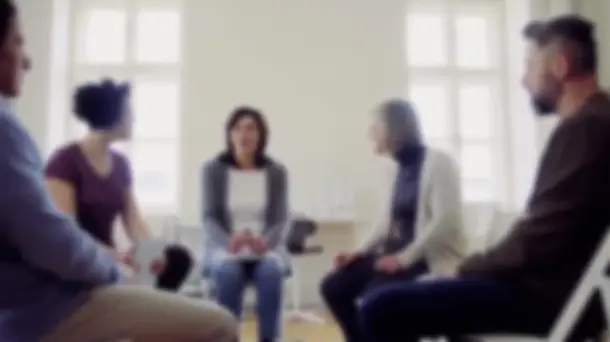Welcome to Narcotics Anonymous
What is our message? The message is that an addict, any addict, can stop using drugs, lose the desire to use, and find a new way to live. Our message is hope and the promise of freedom.

“When new members come to meetings, our sole interest is in their desire for freedom from active addiction and how we can be of help.”
It Works: How and Why, “Third Tradition”
Is NA for me?
This is a question every potential member must answer for themselves. Here are some recommended resources that may be helpful:
Need help for family or a friend?
NA meetings are run by and for addicts. If you're looking for help for a loved one, you can contact Narcotics Anonymous near you.
Subscribe to NAWS Emails
Sign up to receive Just for Today and SPAD daily meditation emails, as well as NAWS News, NAWS Updates, and more.
Never before have so many clean addicts, of their own choice and in free society, been able to meet where they please, to maintain their recovery in complete creative freedom.
Basic Text, “We Do Recover”
Recovery Quicklinks:
Service Quicklinks:
Narcotics Anonymous sprang from the Alcoholics Anonymous Program of the late 1940s, with meetings first emerging in the Los Angeles area of California, USA, in the early Fifties. The NA program started as a small US movement that has grown into one of the world's oldest and largest organizations of its type.
Today, Narcotics Anonymous is well established throughout much of the Americas, Western Europe, Australia, and New Zealand. Newly formed groups and NA communities are now scattered throughout the Indian subcontinent, Africa, East Asia, the Middle East, and Eastern Europe. Narcotics Anonymous books and information pamphlets are currently available in 49 languages.
Information About NA
Daily Meditations
Just for Today
July 18, 2025 |
The gift of desperation |
| Page 208 |
| “Our disease always resurfaced or continued to progress until, in desperation, we sought help from each other in Narcotics Anonymous.“ |
| Basic Text, p. 13 |
| When we think of being desperate, we envision an undesirable state: a poor, bedraggled soul frantically clawing at something sorely needed, a desperate look in the eyes. We think of hunted animals, hungry children, and of ourselves before we found NA. Yet it was the desperation we felt before coming to NA that compelled us to accept the First Step. We were fresh out of ideas, and so became open to new ones. Our insanity had finally risen higher than our wall of denial, forcing us to get honest about our disease. Our best efforts at control had only worn us out; hence, we became willing to surrender. We had received the gift of desperation and, as a result, were able to accept the spiritual principles that make it possible for us to recover. Desperation is what finally drives many of us to ask for help. Once we've reached this state, we can turn around and start anew. Just as the desperate, hunted animal seeks a safe haven, so do we: in Narcotics Anonymous. |
| Just for Today: The gift of desperation has helped me become honest, open-minded, and willing. I am grateful for this gift because it has made my recovery possible. |
A Spiritual Principle a Day
July 18, 2025 |
Growth Takes Vulnerability |
| Page 206 |
| “By asking for help, we can change. Sharing is risky at times, but by becoming vulnerable we are able to grow.“ |
| Basic Text, Chapter 9: Just for Today–Living the Program |
| As kids, some of us became completely self-reliant out of necessity because the people and institutions meant to care for and help us consistently let us down. That skill got us through our using days–until it didn't. Others of us definitely sought help when we were using, but it wasn't to assist us in our growth. The help we wanted was for feeding our addiction and often put us in risky situations. We were vulnerable but not safe. The act of coming to NA is an admission that we need help. But are we thinking of our personal and spiritual development as we drag our butts into our first meeting? For most of us, the answer would be a resounding no! We just want to stop using. A member shared, “Asking for help was not an option. That meant I was weak, a whiner, a loser. I could be retaliated against, humiliated, rejected, or abandoned, cuz that's what happened when I showed vulnerability out there.” Sharing in recovery does pose some risks. Rejection is possible and real. We expose ourselves to feeling shame and guilt. And who wants to experience any of that? Sometimes the risk is about accountability; like, if we tell someone what we're contemplating or feeling, then we might have to do something about it. However, withholding and going it alone make us less safe. We become more fearful, our isolation intensifies, and then acting out can seem like a good idea. As we grow in recovery, the pain we experience from isolating or acting out eventually outweighs the pain of sharing what's going on with us. Our experience of sharing with other members demonstrates that, overall, we find acceptance, support, and love. We learn that it takes courage to be vulnerable. Our desire to grow as recovering addicts eclipses our fears of feeling exposed. |
| ——— ——— ——— ——— ——— |
| I will assess what I may be concealing and where I'm afraid of being vulnerable. I may not make the choice to ask for help today–but I know I'm safer if I do. |
Do you need help with a drug problem?
“If you’re new to NA or planning to go to a Narcotics Anonymous meeting for the first time, it might be nice to know a little bit about what happens in our meetings. The information here is meant to give you an understanding of what we do when we come together to share recovery…”
Subscribe to NAWS Emails
Sign up to receive NAWS Updates and NAWS News emails as well as Just for Today and SPAD daily emails.




